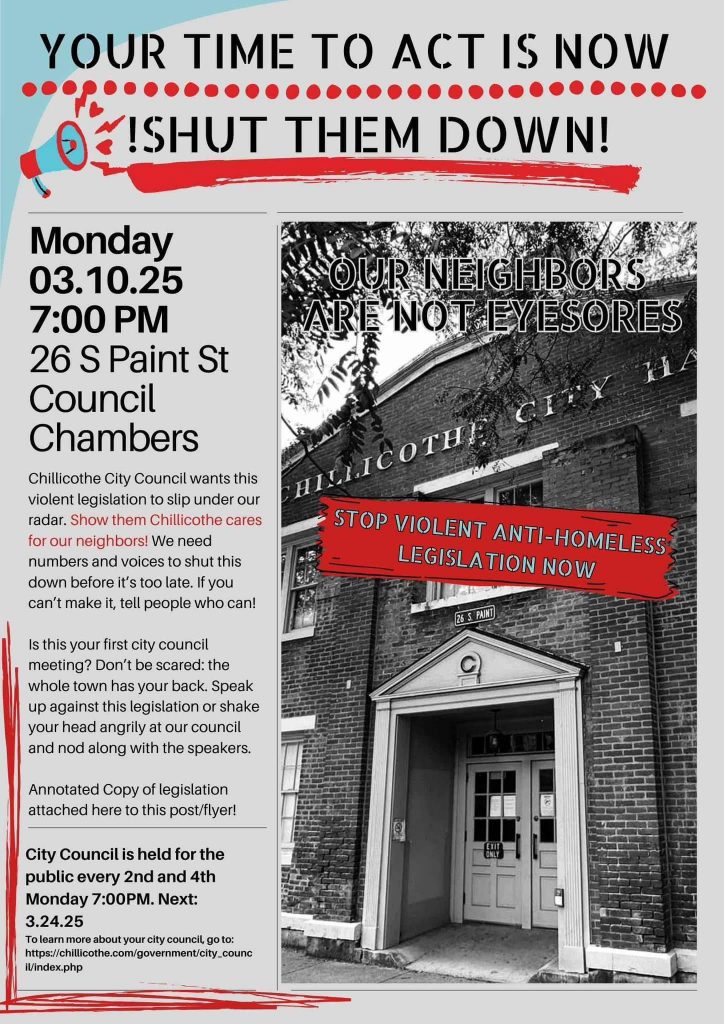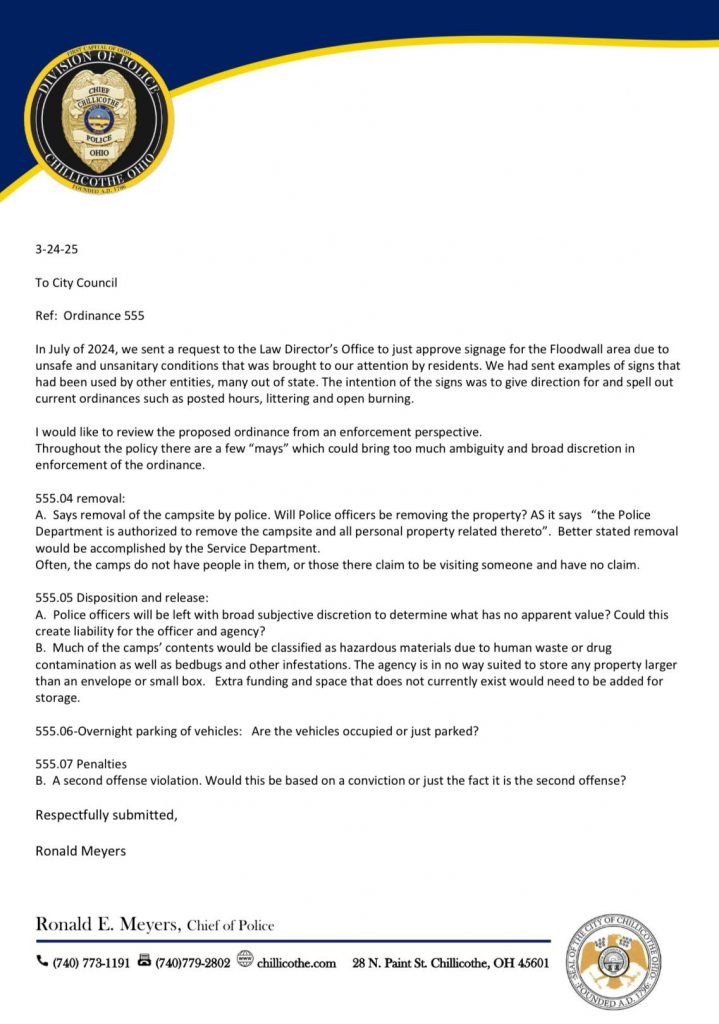

Chillicothe — There have been noisy opinions expressed in opposition to the “Anti-Camping” ordinance, but also growing quieter support of it.
After council’s override of the mayor’s veto of the “Anti-Camping” ordinance on Monday, the ordinance intended to revise police policies on dealing with the homeless has been reinstated. Here is an overview of the varying opinions and statements about it.
Petitions both for and against have been made:
The opposition that created the Facebook page “Stop 555 Chillicothe” posted a list of signatories. The names are not numbered, but the double-spaced single-column list fills six pages. Approximately dated to April 10th, the petition is viewable on a Google Drive. Copies were given to council.
Connie Scott of the Republican Women of Ross County had messaged me on April 24th that “400 people signed a petition supporting the passing of Ordinance 555. These people did not attend city council meetings showing outrage but they are voters who are concerned and want no camping in the park and city sidewalks.”
She pointed out that it was not a petition drive by the political party, but a grass-roots effort.

Opponents filled the March 10th council session. As I wrote in “‘Anti-Camping’” Received its First Reading Amid Protests by Homeless Advocates in Chillicothe Council“:
“Pushback against the ‘Anti-Camping’ proposed ordinance continued as it received its first reading as a formal agenda item in Chillicothe Council…
“Advocates had marched to the council session in old City Hall with small protest signs, and filled the audience seating to overflowing before dominating the public address portion of the council session.”
A flyer on Facebook at the time was titled “YOUR TIME TO ACT IS NOW !SHUT THEM DOWN!” – “We need numbers and voices to shut this down before it’s too late.”
The Chief of Police had criticized the proposed ordinance and what it would require of his department. Chief Ron Meyers’ letter was mentioned by Mayor Luke Feeney in his briefing to council on March 24th. On the Stop 555 page, a digital copy of the letter is posted.
Read more about that in “Facebook Page Created for Opponents of ‘Anti-Camping’ Proposed Ordinance.”

Before council passed the ordinance on April 14th, councilman Gregg McKeever (R) gave a timeline of the development of the ordinance, including what he described as intimidation and doxing of council members.
Hear an interview with him on that in “‘Anti-Camping’ Ordinance Passed in Chillicothe Council,” and read his address to council in “Another Look at the Sides of the Homeless Camp Vote in Chillicothe Council.”
Councilman Dan Demint (R) had originally voted against the ordinance on April 14th, but he was among the votes to restore it on May 12th.
After the original vote, Demint had emailed me an explanation of his action on April 23rd where he included his Facebook post on the day of the vote detailing his thoughts about the legislation.
He wrote that he was “on the fence about this legislation…but I couldn’t get on board with the ‘penalties’ section.” Read both of those below.
Reactions during and after passage: Councilman Gregg McKeever, Mayor Luke Feeney, and the Reverend Terry Williams in “Another Look at the Sides of the Homeless Camp Vote in Chillicothe Council.”
Mayor Luke Feeney vetoed the “Anti-Camping” ordinance on April 23rd, after returning from a family vacation. He sent a letter to council notifying them of that, which you can scroll through below.
In other previous Scioto Post stories on the issue, you can hear from both supporters and opponents in their own words in interviews and videos of public speakers at council sessions.
Also hear Chillicothe council members Jeff Creed and Julie Preston explain the design of the ordinance and why they acted to restore it, in my main story on council from Monday. And, read “Criticism Continues with ‘Anti-Camping’ Veto Override in Chillicothe Council.”
Demint’s email to me:
From: Dan DeMint [email protected] Subject: Potential Mayor Veto Date: April 23, 2025 at 09:16:51 EDT To: Scioto Post [email protected] Good Morning, Kevin! Dan Demint here. As you may know, I was one of three members of Council to vote "no" on the camping legislation nine days ago. That legislation had been up for discussion for almost three months. So, that means I had a lot of time to gather information, get input from many people (including some folks who've been in the struggle), and think about how I would vote, and why. I shared a post on Facebook the day of the vote detailing my thoughts about the legislation, which I will attach to this email. In a nutshell, I was very much on the fence about this legislation because in my mind, the legislation was mostly good and certainly necessary, but I couldn't get on board with the "penalties" section. I did attempt to sell Council on a "non-criminal penalties" version of the legislation, but that didn't go through. Still, the language was written so that it does offer built in safety measures for campers on public property, as well as a mandatory accompanying social services resource officer for a situation where a camp will have to be cleared. Also, an officer is not mandated to issue a ticket or any other charge for an individual who doesn't abide by the posted law. It allows for officer discretion. Legislation is necessary and this legislation is better than nothing, which is where we're at currently. It can always be amended at any time in the future. I still don't like that the option is there for any kind of criminal penalty (this includes tickets), but I believe that CPD brass will use their discretion in a compassionate manner. I fully support and respect Council's decision to pass this legislation, even if I don't exactly see it the same way. I'm reaching out to let you know that if this legislation comes back to Council due to veto action, I will be voting to respect the will of my fellow Council members. In the meantime, we will be working on solving housing issues and providing support for local homeless advocates and organizations. Thanks so much! Dan Demint 6th Ward Councilman [email protected]
Demint’s “Long Read“ of his April 14th Facebook post that he shared with me:
Re: Camping Legislation Vote knows by now that there is a controversial piece of proposed legislation that will soon be voted on by Chillicothe City Council. The “anti-camping” legislation proposes that setting up a camp (tent, sleeping bag, etc.) should be banned on publicly controlled property. This would include areas such as city parks, walking paths (floodwall), streets & sidewalks and government buildings. This would not include areas that are privately owned. That is, pretty much any location not owned or controlled by a government entity. The goal here is simple in practice: Put up signs >> Deter >> Comply. Many people have passionate opinions about this legislation on both sides, as they should. After all, this legislation directly impacts human lives. I’m going to share my thoughts on this legislation and the responses I’ve received concerning it. This may be a long read but hang with me. There has been a lot of misinformation concerning this legislation. I want to begin with the word “camping”. This has been mistakenly, perhaps purposely, rebranded to exclusively mean “homeless individuals”. Would this legislation affect homeless individuals? It absolutely would affect some homeless individuals. I think it’s also important to understand that not all people who set up a “camp” are homeless. That’s not to take away from the homeless argument. I’m simply pointing out that not every person affected by this legislation can be considered homeless. So far, we know that this legislation does not pertain to any place not controlled by the government, and not outside of the City of Chillicothe. That’s probably +90% of all areas within the city not affected by this legislation. We also know that this legislation isn’t directly aimed at homeless individuals, even if it would indeed affect some homeless individuals. Now, I want to dive into the word “criminalize”. As the current legislation is written, it would technically create a criminal charge for a person who refuses to comply with the mandatory order to vacate a camp in a public area, should an officer choose to use such a tool. A minor misdemeanor ticket is still technically a criminal charge. Keep in mind here, it is officer discretion. This legislation does not force an officer to write a ticket. It does, however, force the police department to bring along a social services worker to offer resources to a person who is being asked to vacate an area. this point, we know the following about this legislation: - It does not pertain to over 90% of areas within the City of Chillicothe, and it does not pertain to ANY areas outside of the City of Chillicothe. - It does not pertain to ONLY homeless individuals but would affect some homeless. - It does not mandate a criminal charge for non-compliance of an order to vacate.It does mandate that a social services worker offer resources at point of contact. I want to talk about the “why” behind this legislation. Last spring, and into the summer, there were several tents lined up along the floodwall on Riverside Street, along the walking/biking path from the AEP power station (behind Watt Street) to a little past the underside of the Bridge Street bridge at the corner of Riverside and Bridge Streets. This is near a heavy residential area. Council members and city officials were inundated with complaints about this situation that grew out of control. Complaints included vandalism, litter in yards, drug paraphernalia scattered about, noise complaints, and not feeling safe to use the recreational trail. Someone within Law Enforcement reached out to the Law Director’s Office to investigate doing something about this situation. After all, public property belongs to taxpayers, and everyone has the right to the peaceful enjoyment of that property. To be fair, I visited these camps multiple times on multiple complaints, and this was 100% a safety hazard for EVERYONE. My first thought was, “What if a child steps on used drug paraphernalia, or picks up a discarded drug?” I’ve seen drugs and paraphernalia left behind. I have photos. My second thought was, “What if a small fire burns out of control?” Imagine the liability these camps create for the City. There is precedent for these types of situations. The Law Office drafted legislation, assigned the legislation to Council, Council tweaked the legislation to include safety provisions for camp inhabitants and two extra days to vacate, and here we are. Another quick recap: - It does not pertain to over 90% of areas within the City of Chillicothe, and it does not pertain to ANY areas outside of the City of Chillicothe. - It does not pertain to ONLY homeless individuals but would affect some homeless. - It does not mandate a criminal charge for non-compliance of an order to vacate. - It does mandate that a social services worker offer resources at point of contact. - An inhabitant cannot be forced to vacate if safety issues (such as cold temperatures) were present. - Safety - No one truly knows who campers are, or why they are camping. But it’s not difficult to understand that mixing large encampments with publicly used areas creates multiple safety issues and the potential for major liabilities for the City. Now, as a public servant who should be as transparent as possible about my thoughts on any issue that affects my constituents, I will share my personal thoughts on this legislation. This has been extremely hard on me mentally for a while, to the point that it consumes my thoughts every day. Naturally, I just want to solve problems when there doesn’t seem to be a good answer. Folks, there isn’t an easy answer here because there are too many half-truths. Chillicothe has had some tough economic times, sure, but have we really failed so miserably over the years that we have three times the homeless folks that we had 20 years ago? Have we (as in city government) done enough to address the lack of housing options in our city? Our city currently has an 80-bed shelter on Eastern Avenue and McArthur Gardens on Columbus Street. It’s my understanding that those two aren’t enough, in a town of 21k. How many units should be built? What does the end of homelessness look like in our community? Remember, there is a lot of money tied to this issue. I don’t have all these answers, and I’m not being accusatory here, but I have my own ideas. The truth is that those are valid questions. To the next point, rather or not a person who refuses to comply with a camping ban will be ultimately charged with something criminal, the point is… they still could be because it’s written into the proposed law. Even if I don’t think they would be in most situations, I still don’t like the fact that the option is there only as far as camping in and of itself. I fully believe that there needs to be legislation, even the framework for this legislation, but I do not believe that any criminal action within this legislation truly accomplishes anything of value to the big picture. Rather homeless or not, MOST people who would be affected by this legislation need help. Someone battling addiction but not homelessness still needs help. Someone battling homelessness needs help. Someone who doesn’t care to be homeless needs resources. Someone having mental health issues needs help. There are ways to gain compliance without criminal action and help the individual at the same time. Think about mandatory check-ins with social service resource officers as an alternative to tickets and misdemeanors. Bottom line for me is that Chillicothe is a small city. We do not have a lot of financial resources. There are steps we can all take as a community to deal with this. Step One – Build Housing – Units for all income brackets, and for chronically homeless individuals. This requires a collaborative effort that would require grants, private development, and some local government resources. Step Two – Do not import, unless absolutely necessary for care of the individual. This goes back to the resources currently available. Step three – Be empathetic and understanding toward individuals who need help and resources. * Legislation is necessary but should be written differently.* I don’t want this to be political. We should all be honest with ourselves, answer the tough questions, and do whatever is necessary for the safety and well-being of every individual in our town.







